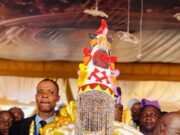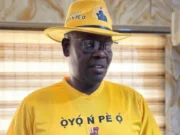Poverty is perhaps the best teacher of civics. In my ancestral homes in Ibadan, we have produced three governors: Ladoja, Ajimobi and Makinde. But trust me, you won’t get better index of deep-seated hardship, chronic misery, multidimensiona
From Isale-Osi area through Agboole Olowo-Ake in Oja’ba, via Ile Ajimobi, all the way to Isale Mosalasi Jimo, what you’d find is hydra-headed poverty dancing Naira Marley’s Soapy on the streets and inside the Agbooles. Yet these areas, which form the larger Oja’ba-Born Photo axis, a strategic part of the heart of IbadanLand, threw up a whopping three of the five gubernatorial elements produced in this present republic: Rashidi Ladoja emerged from Isale-Osi area, somewhere not too far away from my paternal Grandma’s ancestral home, Ile Iponriku; Abiola Ajimobi, the son of Baba Gani Taylor, hails from Ile-Ajimobi, located directly opposite our family compound, in Oja’ba; Oluseyi Makinde hails from Isale Mosalasi Jimo, somewhere after Ile-Awa, adjacent a sloppy lane that leads to Mapo Hill, where we have ancestral connections.
If we stretch the power dynamics a little further even, our area also produced by far the most influential political Czar of his era, who, by sheer violence and the conspiratorial support of the state, installed and removed governors at will: the late Lamidi Ariyibi Akanji Adedibu of Ile Olowo-Ake area of Oja’ba.
Yet what I realise each time I visit the neighborhood (and I do that always, always) is that the defining features have remained the same for decades: thuggery, poverty, arson, child labour/
While the fact remains that having someone who shares certain traits with us in power/
What then is the logic in mindlessly defending an incompetent, clueless, mischievous or hopelessly corrupt “Son” only on the basis of the traits he shares with us——even while we continue wallowing in abject poverty and misery?
I made a post about the hypocrisy of the political class yesterday and a big brother telephoned me to give a long, winding lecture on why, referring to Abiola Ajimobi, we must “protect our own” like every other person does in the state and across the country. SMH!
Interestingly, based on his track records in project delivery ACROSS THE STATE, warts and all, there are grounds to “protect” (I have reservations for that choice of words but it’s all good) Abiola Ajimobi as a governor of Oyo state than there are to “protect” him as “Our Son” from Oja’ba. For one, apart from an uncompleted building/plaza he planted in front of Ile-Ajimobi in Oja’ba, I do not know of anything significant he did to the larger Oja’ba community. Ditto Rashidi Ladoja who hails from Isale-Osi area where perhaps the most significant project enjoyed by the people was named after another governor from elsewhere: ‘Titi Akala’ (Alao-Akala Road).
Yet, that, for me, isn’t supposed to be a big deal.
For, it would be reactionary, disingenuous and anti-progressiv
What is ideal and should be promoted is a situation where an elected leader is fair to all, while providing inclusive governance that allows people rise above poverty and deprivations, irrespective of where they come from. As Orlando Patterson argued in his book, inherent tribalism and segregationist tendencies must give way for ethnic pluralism and the integrity of ethnic neighborhoods and celebration of universally shared values.
To be sure, I am not delusional to the point of discountenancin
While in Ibadan, I spoke tongue-in-cheek
And there is the one sad revelation: poverty—-chro



































